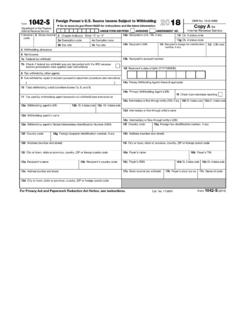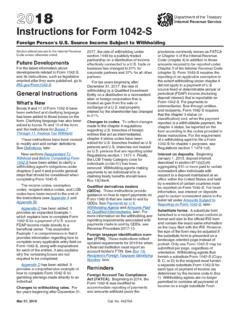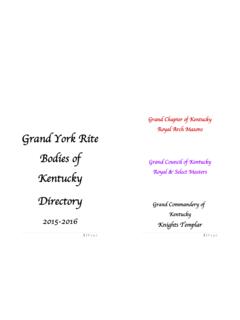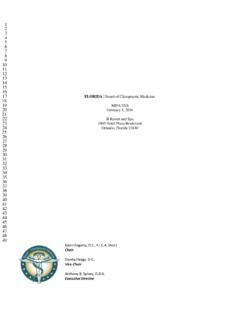Transcription of SURVEILLANCE AND PRIVACY LAW TEXAS …
1 SURVEILLANCE AND PRIVACY LAW TEXAS ASSOCIATION OF licensed investigators world investigators conference august 17, 2016 JAMES WES BEARDEN, ATTORNEY BEARDEN INVESTIGATIVE AGENCY, INC. 1825 Market Center Boulevard, Suite 610 Dallas, TEXAS 75207 (214) 220-0111 (Tel.) (214) 855-1250 (Fax) 829 Baronne Street New Orleans, Louisiana 70113 (504) 702-6786 (Tel.) (504) 702-6797 (Fax) SURVEILLANCE AND PRIVACY LAW 3 I. INTRODUCTION. A. Where is the Law? This presentation draws from a number of areas of law that cannot be all thoroughly explored form here. This law comes from a number of areas of common law and state and federal statutes. There is no way in which we can exhaustively explore all of these areas of law.
2 However, a good list of many of them are listed below: 1. Constitution The highest law of the land. Particularly, 4th Amendment (protection against search and seizure) of the bill of rights that guarantees individual protection against government intrusion. But, also general PRIVACY protections including the 1st Amendment ( PRIVACY of beliefs); 3rd Amendment ( PRIVACY of the home against use by soldiers); 4th Amendment ( PRIVACY of the person and possessions); and the 5th Amendment Self-Incrimination Privilege (which provides protection for the PRIVACY of personal information). 2. TEXAS or State Penal Code State criminal code that contains offences which are recognized in in TEXAS and the penalties which might be imposed for these offences and some general provisions.
3 3. Electronic Communication PRIVACY Act ( ECPA ) Federal law primarily designed to prevent unauthorized access to private electronic communications. 4. PRIVACY Act of 1974 Federal law that governs the collection, maintena nce, use, and dissemination of personally identifiable information about individuals that is maintained in systems of records by federal agencies. 5. Common Law Invasion of PRIVACY Common tort law, across the United States, that allows a cause of action under four categories. Those are intrusion on seclusion, public disclosure of private facts, false light and misappropriation of a person s likeness. 6. TEXAS Civil Practices Remedies Code ( TCPRC ) Topic by topic statute law after revision by the TEXAS Legislative Council.
4 Civil practice code and statute law. 7. Federal Rules of Evidence. ( FRE ) - First adopted in 1975, the Federal Rules of Evidence codify the evidence law (what gets in and out of evidence) that applies in United States Federal courts. 8. Federal Rules of Civil Procedure. ( FRCP ) The Federal Rules of C ivil Procedure govern civil procedure for civil lawsuits in United States Federal District courts. SURVEILLANCE AND PRIVACY LAW 4 9. All Writs Act of 1789 A federal statute which authorizes federal courts to issue all court orders necessary or appropriate in aid of their respective jurisdictions and agreeable to the usages and principles of law. 10. Stored Communications Act ( SCA ) Addresses the voluntary and compelled disclosure of "stored wire and electronic communications and transactional records" held by third-party internet service providers.
5 11. TEXAS or State Disciplinary Rules of Professional Conduct ( TRPC ) Rules that prescribe baseline standards of legal ethics and professiona l responsibility for lawyers in the United States. 12. TEXAS or State Rules of Evidence ( TRE ) The codified evidence law (what gets in and out of evidence) that applies in TEXAS courts. Very similar to the Federal Rules of Evidence. 13. TEXAS or State Rules of Civil Procedure ( TRCP ) The TEXAS Rules of Civil Procedure govern civil procedure for civil lawsuits in TEXAS courts. 14. Communications Assistance for Law Enforcement Act. ( CALEA ) Enhances the ability of law enforcement agencies to conduct electronic SURVEILLANCE by requiring that telecommunications carriers and manufacturers of telecommunications equipment modify and design their equipment, facilities, and services to ensure that they have built-in SURVEILLANCE capabilities, allowing federal agencies to wiretap any telephone, broadband Internet and VoIP traffic.
6 15. TEXAS PRIVACY Act State act that provides for use of unmanned aircraft. II. CREATING A DECISION FRAMEWORK. Basically, how do we make decisions regarding technology that is ever changing in a world of law that doesn t evolve at nearly the same pace. A. Decision Tests This following sections deal with evidence ultimately used in a hearing or at trial and the subsequent rules for use, admittance, authentication and whether your investigative technique or method violates the law or not. Because of the gargantuan amount of conflicting law, you must create some framework by way to make a decision about whether to do what you or your client wishes. 1. Line Test Is what your about to do going to cross the line?
7 In reality, there are really two lines. The first is a line under which all conduct is legal, accepted, recognized and very often not even criticized. The area beyond SURVEILLANCE AND PRIVACY LAW 5 that line is more grey. It is highly dependent on factual situations, location, and current political and legal movements. The final line is a line where activity beyond that is illegal, clearly unethical, prohibited or highly criticized. That is a no go zone. 2. Press Test The below is organized according to an adopted and modified legal ethics test. Similar to the Stansfield Turner National Interest Test but, with following considerations for all involved: a) Criminal Responsibility; b) Civil Responsibility; c) Codified Ethical Responsibility; d) Potential to Defend to the Opposing Party and/or Tribunal; AND e) Potential to Defend to the Public.
8 The potential, is the ability of the authorizer to justify the activity to the designated party. Ultimately, you have to factor all of these and PRESS the potential liability. Then, you must weigh what benefit you get from authorization and what overall liability exists on the other side. Again, consider a) through e), press the liability together, then weigh what you get by authorization. III. ACTIVITY BARRED BY CRIMINAL LAW. A. Wiretapping Both Federal and State statutes, including TEXAS prohibit interception of a voice communication unless at least one party to the communication knows of and consents to the interception at the time of interception.
9 18 USCA 2510 et seq.; Tex. Penal Code Ann The acts, in essence, mirror each other. But, their interpretation and exceptions differ. 1. Electronic Communications PRIVACY Act of 1986 ( ECPA ) ECPA was an amendment to Title III of the Omnibus Crime Control and Safe Streets Act of 1968, which was primarily designed to prevent unauthor ized government access to private electronic communications. It now protects wire, oral and electronic communications while in transit from interceptio n by a third party. The act, also known as the Federal Wiretap Act, prohibits the interceptio n of oral or wire communication by use of any electronic, mechanical or other device. 18 2511. SURVEILLANCE AND PRIVACY LAW 6 a) Effect on State Law Title I and II of the Electronic Communications PRIVACY Act ( ECPA ), preempts state law that provide less security for conversation.
10 However, states can provide more protection by statute. b) Two Party States These "two-party consent" laws have been adopted in; (1) California. (2) Connecticut. (3) Florida. (4) Illinois. (5) Maryland. (6) Massachusetts. (7) Montana. (8) New Hampshire. (9) Pennsylvania. (10) Washington. c) Complicated Two Party States Some states have complicated and ambiguous statutes that you should be aware of when investigating in those areas. (1) Illinois Illinois s two-party consent statute was held unconstitutional in 2014. People v. Melongo, 2014 IL 114852 (2014). It has now been revised and prohibits recording of a private conversation. 720 Illinois Compiled Statutes 5 / Criminal Code of 2012 Article 14.




